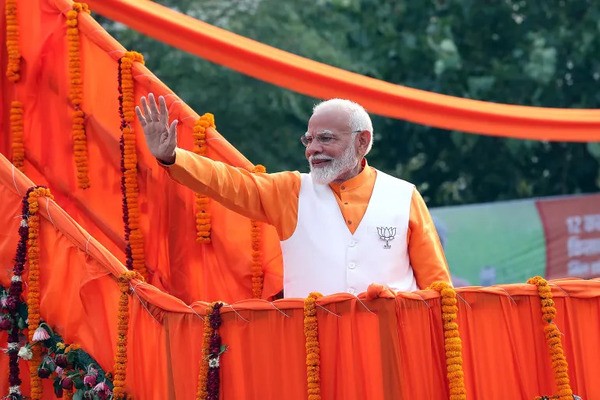Iran’s Plan to Strike Back Against the U.S.
Iran’s Military Preparations Following U.S. Attacks
Loading...

In contrast to 2019, Pakistan was notably absent from India's election discourse. However, that dynamic has shifted, all triggered by a succinct three-word social media post. What developments lie ahead for these neighboring countries?
In Islamabad, Pakistan, Fawad Chaudhry, the former information minister, admits to being caught off guard by the unintended consequences of a brief three-word post on social media platform X on May 1. Little did he realize that this post would thrust his country into the midst of a contentious dialogue it had previously sidestepped: India's clamorous election campaign.
He simply wrote "Rahul on fire..." while sharing a video clip featuring Rahul Gandhi, a prominent figure in India's opposition Congress party, as he voiced criticism against Prime Minister Narendra Modi's ruling Bharatiya Janata Party (BJP).
Chaudhry's post, emerging amidst India's extensive election process spanning seven voting days from April to June, swiftly gained traction, amassing over 1.8 million views, 1,800 retweets, and garnering more than 1,500 replies.
One of the respondents was Amit Malviya, the head of BJP's information technology wing, responsible for managing the party's expansive social media presence. Malviya accused Chaudhry of endorsing Congress leader Gandhi, asking whether Congress intended to contest elections in Pakistan. He pointed out the historical association of the Muslim League, a major political force in pre-Partition India, with the creation of Pakistan.
A day later, Modi himself referenced Chaudhry's post during an election rally in his home state of Gujarat, highlighting how Pakistani leaders were reportedly showing support for the Congress party. Modi suggested that Pakistan was eager to see Congress leader Rahul Gandhi become prime minister, insinuating a close relationship between Congress and Pakistan.
Following this, Pakistan became a recurring theme in speeches by Modi and other BJP leaders such as Home Minister Amit Shah. They used Pakistan as a tool to target the opposition and showcase the government's strong stance during tensions with the neighboring country.
Modi's speeches often contained inflammatory rhetoric, such as using a crude Hindi metaphor to assert his government's dominance over Pakistan. Shah also emphasized India's strong response to terrorism from Pakistan under Modi's leadership.
This heightened focus on Pakistan contrasts sharply with the pre-May campaign period, where relations between the two countries were largely ignored as an election topic.
Chaudhry, whose social media post triggered this exchange, expressed surprise at the reaction, especially from PM Modi.
Pakistan's government also responded to Modi and Shah's comments, criticizing their "unhealthy and entrenched obsession with Pakistan." The Foreign Ministry accused Indian leaders of exploiting hyper-nationalism for electoral gains, questioning India's responsible stewardship of its strategic capabilities.
While Pakistan's involvement in Indian elections isn't new, it has taken on a more prominent role in the past.
The two countries have had a strained relationship since their independence in 1947, marked by three major wars and ongoing tensions over Kashmir.
In the 2019 election, Modi's campaign heavily focused on Pakistan, particularly following a terrorist attack in Indian-administered Kashmir that led to military escalation between the two countries.
Despite this renewed focus on Pakistan in the current election campaign, some analysts suggest that India's primary foreign policy challenge now lies with China, particularly after border clashes in 2020 resulted in Indian territorial losses.
What unfolds if the BJP secures victory once more?
Numerous opinion polls indicate that Modi and the BJP stand as strong contenders to clinch power for a third term.
In such a scenario, according to Chaudhry, the former Pakistani minister, already fragile bilateral relations would likely deteriorate further.
"If the BJP and Modi triumph in the elections as they are confidently predicting, it's improbable that relations with Pakistan will see any improvement; rather, they might worsen," he remarked.
However, some analysts propose a different perspective. Despite Modi's rhetoric, they argue that Pakistan's deep-rooted economic challenges and India's growing concerns regarding China's threat provide both New Delhi and Islamabad with a motive to substantially enhance their relations.
Walter Ladwig, noting past attempts by several Indian administrations to foster better ties with Pakistan, highlighted Modi's potential legacy aspirations in his third term. Ladwig suggested that "some form of enduring reconciliation with Pakistan" could align with Modi's long-term objectives.
Iran’s Military Preparations Following U.S. Attacks
Troops remain in five strategic locations, raising fears of renewed tensions and long-term occupation.
Opposition forces have taken control of the capital after a significant offensive. Here is how it unravelled.
